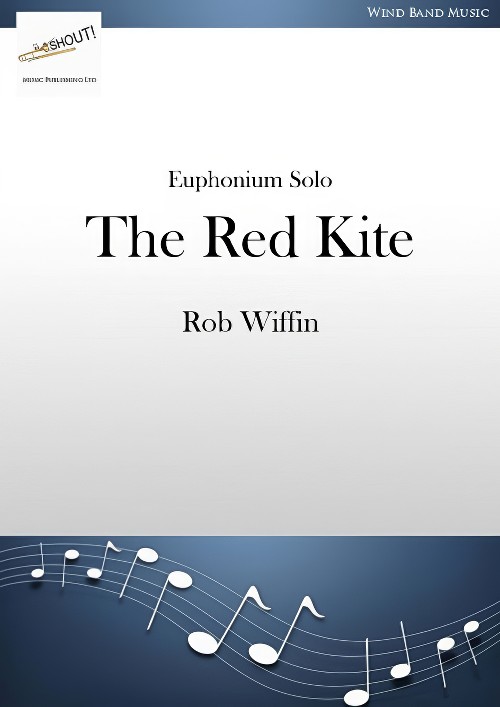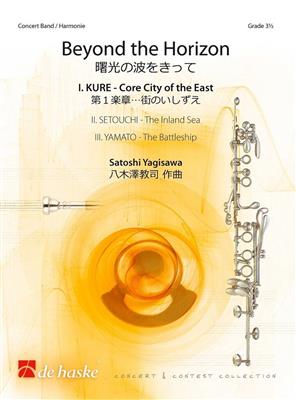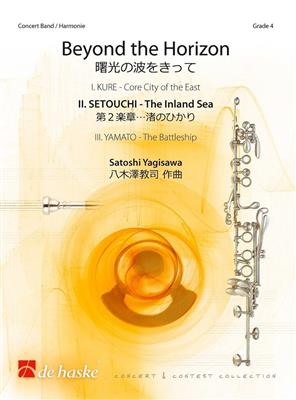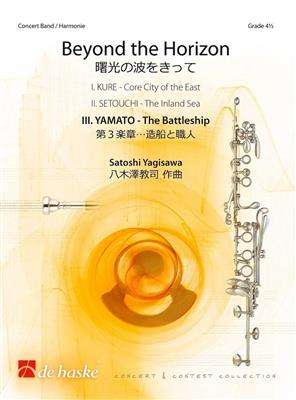Results
-
 £109.99
£109.99Te Deum Wind Band Set (Score & Parts)
Gro?er Gott, wir loben dich is a well-known German hymn, written by Ignaz Franz in the 18th century but based on the 4th century Te Deum laudamus. After a radiant introduction by the brass section, the first variation on the chorale appears. Subsequently, the song is rendered in its original form. Then three more variations follow. The result is a solemn work that is very fitting within the context of a church service, but is also suitable for many other occasions. 0:08:30
Estimated dispatch 7-14 working days
-
 £36.95
£36.95The Red Kite (Euphonium Solo with Concert Band - Score and Parts) - Wiffin, Rob
At one time the Red Kite was close to national extinction in the UK but now it is possible to admire this distinctive bird of prey with its red colouring and forked tail. I love watching it soaring so gracefully through the sky. I attempted to catch that feeling in this solo composed for Martin Smith. In writing it I had in mind making the euphonium glide solitary and effortlessly, occasionally swooping down then reclaiming its high altitude.To create the desired atmosphere, I avoided too many root position chords and enhanced the feeling of floating by adding notes to a lot of the harmony, giving it subtle colour. The harmonic rhythm is slow but the movement switches in the way that the Red Kite can make slight changes of direction by minor adjustments of its tail. On top of this accompaniment the soloist is left to sing with a sense of grace and freedom.- Rob WiffinDuration: 3.45
Estimated dispatch 7-14 working days
-
 £137.99
£137.99Theme Park Fun! Wind Band Set (Score & Parts)
In Theme Park Fun! your orchestra pays a visit to an amusement park. During your visit, you will experience some spectacular rides and attractions this theme park offers. The uniqueness of Theme Park Fun! is the interplay between music and (moving) images. Animations and illustrations support the visual composition.Part 1: The Entrance & Parade [with animation]The opening of the park is a fact. A day full of fun and pleasure awaits! You and the other visitors will be confronted with all the rides, attractions and adventures the theme park has to offer. Which ride shall we do first?! There is so much to do and experience on this day in the park! A parade of colorful floats and park figures is passing by.Let the fun begin!Part 2: The Haunted House [with animation]The only ride in the park that is not related to fun, is the Haunted House. Here visitors will be challenged to visit a house full of ghosts, creepy figures and other ominous things. The clock strikes twelve, there is no turning back. Ghosts are whispering, yelling, screaming... Fortunately it is almost one oclock, so we can leave this creepy place quickly.Part 3: The Swinging Galleon [with illustrations]What a huge pirate ship! Each time you swing back and forth, you will feel that weird feeling in your stomach. When you are thrown completely into the top you will have a fantastic view over the park, but you can not enjoy it for long. Before you know the ship swings back the other way.Part 4: The Fairy Tale Ride [with illustrations]After all those exciting and spectacular rides and attractions, it is time for a peaceful tour in The Fairy Tale Ride. Surrounded by a fairytale setting, you will discover fable figures, talking animals and colorful designs. Such a beauty and tranquility. Having had this experience, we are ready again for the big rides in the park!Part 5: The Bumper Cars [with illustrations]Now its time to crawl behind the wheel of the Bumper Cars! Shall we all chase the conductor?! Before you know you are hit by another visitor or you will bump against someone else. In this tough ride you can prove yourself as a real driver, or perhaps as a really bad one.Part 6: The Roller Coaster [with illustrations]The largest, fastest and scariest ride in the park ... we should definitely do the Roller Coaster! All together in the train, the over-the-shoulder restraints are lowering... be ready to ride. The train leaves the station and is heading for the big lift hill. It will be very scary when the train reaches the top and the train will be plunged down the first drop! Loops, corkscrews and other spectacular coaster elements will follow... Before you know it, the ride of your life is over. Shall we ride it again?!Part 7: Leaving the Park [with animation]Unfortunately everything comes to an end. This day in the theme park is over, but we have a lot new experiences to talk about! The memories of all the funny and spectacular rides will come up when we walk through the park to the exit. Just one look over the shoulder, the amusement park figures are waving at us. Hopefully we will come back again soon! 14:30
Estimated dispatch 7-14 working days
-
 £55.00
£55.00Capriccio (Concert Band - Score and Parts) - Holst, Gustav - Boyd, John
Holst composed this short, light-hearted but tuneful work in 1932, while on a visit to the USA, for Nathaniel Shilkret's concert jazz band. He was asked to use a folk tune but invented one of his own. The piece was not performed and remained in manuscript. This version for wind band was arranged by John Boyd with the approval of Imogen Holst. Duration: 5.00
Estimated dispatch 7-14 working days
-
 £124.99
£124.99Resurgence - Philip Sparke
Resurgence was commissioned by Nishiusuki Kyoiku Shinko Rengokai to celebrate its 10th anniversary in 2023. The commissioners are a non-profit organization for educational promotion in Japan and have founded a concert band, who gave the premiere at their anniversary concert. The piece opens with a flourish which leads to a martial theme in the brass, but this quickly subsides to introduce a chorale in the lower brass. After reaching a climax, the work slowly builds to the main vivo section. Here the opening fanfare is repeated, but instead leads to a dance-like tune in the clarinets. This is taken up by the full band and develops until the saxes change key with a legato melody. Following a repeat on trumpet, the chorale from the introduction briefly reappears to herald a recapitulation, which drives to a short coda, where hints of the opening martial theme bring the work to a triumphal close.
Estimated dispatch 7-14 working days
-
 £99.99
£99.99Beyond the Horizon - I. KURE-Core City of the East - Satoshi Yagisawa
Beyond the Horizon is available in three separate movements that each can be played independently, but also link up with each other perfectly to form a rounded whole. Thus it is possible to perform the complete three-movement work, but you can also choose to play one of the movements. The first movement, 'Kure', describes the lively Japanese city of the same name and its surroundings. Movement two, 'Setouchi', reflects the local inland sea. The third movement, 'Yamato', is all about the battleship that was built at the naval shipyard of Kure. Three expressive pieces of music full of atmosphere!DHP 1256483-010 - I. KURE - Core City of the EastDHP 1256484-010 - II. SETOUCHI - The Inland SeaDHP 1256485-010 - III. YAMATO - The Battleship
Estimated dispatch 7-14 working days
-
 £68.99
£68.99Beyond the Horizon - II. SETOUCHI-The Inland Sea - Satoshi Yagisawa
Beyond the Horizon is available in three separate movements that each can be played independently, but also link up with each other perfectly to form a rounded whole. Thus it is possible to perform the complete three-movement work, but you can also choose to play one of the movements. The first movement, 'Kure', describes the lively Japanese city of the same name and its surroundings. Movement two, 'Setouchi', reflects the local inland sea. The third movement, 'Yamato', is all about the battleship that was built at the naval shipyard of Kure. Three expressive pieces of music full of atmosphere!DHP 1256483-010 - I. KURE - Core City of the EastDHP 1256484-010 - II. SETOUCHI - The Inland SeaDHP 1256485-010 - III. YAMATO - The Battleship
Estimated dispatch 7-14 working days
-
 £114.99
£114.99Beyond the Horizon - III. YAMATO-The Battleship - Satoshi Yagisawa
Beyond the Horizon is available in three separate movements that each can be played independently, but also link up with each other perfectly to form a rounded whole. Thus it is possible to perform the complete three-movement work, but you can also choose to play one of the movements. The first movement, 'Kure', describes the lively Japanese city of the same name and its surroundings. Movement two, 'Setouchi', reflects the local inland sea. The third movement, 'Yamato', is all about the battleship that was built at the naval shipyard of Kure. Three expressive pieces of music full of atmosphere!DHP 1256483-010 - I. KURE - Core City of the EastDHP 1256484-010 - II. SETOUCHI - The Inland SeaDHP 1256485-010 - III. YAMATO - The Battleship
Estimated dispatch 7-14 working days
-
 £139.00
£139.00Me and Mrs. Jones - Kenneth Gamble
Me and Mrs. Jones was written by Kenny Gamble, Leon Huff and Cary Gilbert in 1972, and was first recorded by Billy Paul on the album 360 Degrees of Billy Paul. The song is about a man who has an affair with Mrs. Jones, and how the two secretly meet every day in the same cafe, even though they may know it's not quite right: "We got a thing going on/we both know that it's wrong/but it's much too strong/to let it go now." Paul has stated that he was sure the song was going to be a hit even before it was released, as "it's a song everyone can relate to", but already from the start the lyrics were considered somewhat controversial and the song were banned from several radio stations. Nevertheless, it became one of the best-selling singles of 1972 and Paul received a Grammy for Best Male R&B Vocal Performance.Well known is also Michael Bubl's version of the song, released on the album Call Me Irresponsible in 2007. It is his version that has been the inspiration for this arrangement, which brings out even more of the jazz elements Bubl has found in the song. The arrangement is quite demanding for the ensemble, and requires great rhythmic precision in particular.
Estimated dispatch 7-14 working days
-
 £118.99
£118.99Princess Mononoke, Medley - Joe Hisaishi
Series: New Sounds in Brass (NSB); Duration: approx.8'50"; Composed by Joe Hisaishi; Arranged by Takashi Hoshide. Arranger Takashi Hoshide says, "I have selected beautiful melodies from the soundtrack of 'Princess Mononoke' (1997, directed by Hayao Miyazaki) and arranged them into a medley. What can be said about these songs as a whole is that they combine a grand continental scale with the delicacy that reflects Japanese emotions. Since there are no upbeat songs in this selection, I had to work hard on the arrangement, but this allowed for creating contrasts and transitions between each scene in the performance. 'Ashitaka Sekki (English title: The Legend of Ashitaka)' - 'Sekki' means a story that is not recorded but passed down orally. In this anime, this can be considered a sub-main theme. The song starts with a feeling that the story is about to begin and, once the theme kicks in, aim for a grand performance to convey its scale. 'Encounter' - This is the music that plays during the scene where the protagonist Ashitaka meets San. Interestingly, the motif of the main theme 'Princess Mononoke' is used in this melody. Here, let's pursue the shifts in the timbre of individual phrases, creating a beautiful and aesthetic soundscape. 'Princess Mononoke' - This is the main title of the anime. The melody line is carried by horns and trumpets."
Estimated dispatch 7-14 working days
